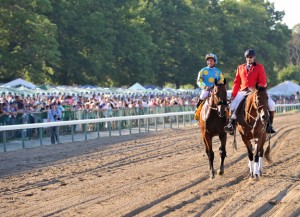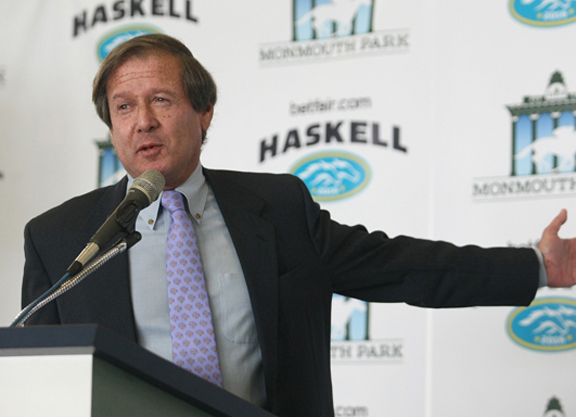By T. D. Thornton
Thoroughbred racing in New Jersey is at a competitive crossroads as 2017 approaches. The New Jersey Thoroughbred Horsemen's Association (NJTHA), which leases Monmouth Park, has been actively engaged for several years on several different fronts in trying to boost purses via alternative forms of gaming. Exchange wagering is legal in New Jersey, attempts to bring sports betting to tracks in the state might be headed for a United States Supreme Court showdown, and a casino referendum failed badly at the Nov. 8 elections.
Recently, a new piece of legislation was introduced that would allow “Internet cafes” to deliver various forms of online wagering at tracks. Dennis Drazin, advisor to the NJTHA, recently spoke to TDN via phone to sort it all out. An edited transcript follows.
TDN: Please fill us in on the latest initiative to help New Jersey racing, Assembly bill No. 4255, regarding the Internet wagering cafes. Were you involved in crafting that legislation?
DD: I was. I went down to the Assembly hearing and testified. Basically, it's not a new theory, it's been something that's been under consideration for awhile. But it moved forward when the casino expansion referendum was defeated, and this became important for us to pursue. The Legislature has the power to modify the online gaming bill that is currently in existence. Casinos are permitted to conduct online gaming. And what this bill would do is permit racetracks and casinos to enter into an agreement where the racetrack, in effect, leases some space to the casinos and they set up an online gaming cafe where they can offer the same type of gaming that casinos offer on the Internet. So we see this as a win-win for both casinos and racetracks.
TDN: How so?
DD: Casinos have been slowly growing their [Internet] product. But we know that at racetracks, there are already proven bettors who enjoy wagering. We think that a lot of people who are waiting between races or want to go [to tracks] and have another type of alternative gaming would go to these [cafe] venues, and that would actually increase the revenue for the casinos on their online gaming product.
TDN: How would the deal help horsemen and what would the cafes look like?
DD: So the concept is a one-dollar lease for the space, and then a revenue share that would be negotiated between racetracks and casinos. The formula that I think works for us would be a 50/50 revenue share. The casinos would come into the tracks, they'd set up a glitzy type of casino-floor atmosphere. They'd have a bank of computer screens where the consumer could come in and enjoy whatever type of online gaming they want to play. Whatever casinos currently offer online that you could [access] on your own [device], they would offer at the track cafe. There could be a touch screen at the racetrack that would enable the consumer to select amongst all of the casino properties that currently offer online gaming and play whatever games they have. If all of the casino properties don't want to partner on this, then the tracks could make a deal with the casinos that do want to.
TDN: If the law right now already allows players in-state to access these games on their personal devices, what would be the appeal to consumers for having the cafes?
DD: Everybody's different. I can sit in my home, and I can bet on horse racing. But I might choose to come to the track because I want to see the live product, or I want the camaraderie of playing with other bettors, or I might want to enjoy the food and beverage choices that they offer at the track. The public, although they know online gaming is out there, we think that they'd be more apt to participate if there was someplace to go to enjoy it. Right now, if you wanted to, you could come into Monmouth Park with your smart phone or your tablet, and you could sit in your box and play casino games. I'm sure there are some people who do that.
TDN: What would be the incentive for casinos to participate?
DD: This would offer the casinos the opportunity to market their product. I do know that the casinos are having a lot of difficulties with online gaming; banking difficulties with making deposits to fund the accounts. Plus there are the uncertainties that the public has–you know, even though it's legal, some people aren't sure. So this way, casinos can grow their business because [the tracks] would provide an environment where it would be easier to open up accounts, easier to fund those accounts. And we think that's something that would also be well-received by the public.
TDN: Still, there might be casinos that could consider this to be giving away customers to the tracks.
DD: We're mindful that the casinos are concerned that if the track had the right to [offer this concept on its own], it might undermine Atlantic City. But the concept is the tracks can't do anything unless the casinos decide to do it. So the bill is harmless to the casinos, because unless the casinos decide, “This is something we want to do and this is how we want to do it,” the tracks can't proceed on their own. So it's really a casino product to help them expand their market.
TDN: The Internet cafe concept has been described by anti-gambling opponents as a “sneak move” to bring gaming to the state's tracks considering how soundly the casino measure was defeated in the recent election. How do you respond to that?
DD: I'd respond by saying I don't think those people are looking at this very intelligently. The current referendum was overwhelmingly defeated because of the format in which it was presented to the voters. It was two casinos in north Jersey that had to be beyond 72 miles, so Monmouth was certainly cut out. There was no transparency as to what the tax rate would be; no transparency as to who was getting what money. Atlantic City operators feared the expansion because they believed it would hurt their business. This is something designed to help their business.

American Pharoah at Monmouth Park Sarah K. Andrew
TDN: How about if the casinos themselves turned their backs on this piece of legislation?
DD: This is what I would say in response to the casinos: When they designed Internet gaming, and this went through the Legislature, there was concern that under the New Jersey Constitution, [Internet gaming] had to be presented to the voters. And the casinos that participate in Internet gaming right now did not do that. They took a chance–even though, in my opinion, this violates the Constitution for online gaming as currently designed–that nobody was going to challenge them. Because certainly an argument can be made that the casinos [are utilizing a geographical] gimmick–the online server is in Atlantic City and the bettor is up in north Jersey. And somehow that bet is made in Atlantic City? I don't think so. But I didn't challenge it at the time because I wanted to see the casinos survive. I didn't want to attack them. But I can assure you that if the casinos now say, “We're going to oppose the racing industry bill,” then I will be looking to challenge whether what the casinos are doing [with online gaming] is consistent with our Constitution here in New Jersey. So if they want a fight, they're about to pick one.
TDN: As New Jersey wades through the various alternative gaming initiatives that are either proposed in the Legislature, tied up in the courts, or in the pipeline for the future, what's your take on the near-term prospects for Thoroughbred racing in the state?
DD: The difficulty is that all the other states around us have alternative gaming, which we don't have. They're growing their purses, and we can't be as competitive as we'd like to be because we don't have these things. Right now the sports betting case is on petition before the U.S. Supreme Court, and they will probably decide whether they're going to hear the case by late January. I think long term, sports betting will be permitted in New Jersey, and in many other states. I think if you look at a five-year window, sports betting will eventually get done. But there are other alternatives. We certainly don't intend to give up on the alternative gaming side. Even though the [casino] referendum was defeated, it's going to come back. It won't come back in the same form, but there will be additional attempts to put slots at tracks. I think the long-term prospects for Monmouth Park and racing are very good here in New Jersey. I think we just have to keep persevering while we're waiting for better things to happen on the legislative front.
Not a subscriber? Click here to sign up for the daily PDF or alerts.






